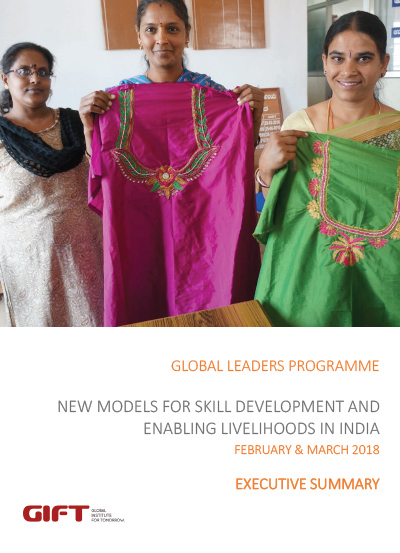Within the coming decade, India is expected to become the world’s most populous nation and the youngest country, with an average age of 29. This demographic transition makes it imperative to ensure employment opportunities for the more than 12 million youth entering the workforce every year. Currently, only about 5% of India’s workforce undergoes any form of skill development. The country therefore faces a dual challenge: a severe shortage of highly trained labour and the non-employability of large sections of the educated workforce who possess little or no job skills. Developing a skilled and employment-ready workforce is critical for India’s economic growth and social development, and will determine whether it can truly harness its “demographic dividend.”
In February 2018, an international cohort of high-potential managers from a dozen companies and countries participated in the Global Institute for Tomorrow’s flagship Global Leaders Programme (GLP) in Hong Kong and India. Internationally recognised for its intellectual rigour, experiential methodology, and output-driven approach, the GLP puts participants’ leadership and problem-solving abilities to the test through real-world business projects in emerging markets.
As part of this programme, participants worked on a field project in Bangalore and Mysore with one of India’s largest skill development providers, LabourNet. Tasked with finding creative and sustainable ways to support LabourNet’s mission to skill and enable livelihoods across India, the cohort conducted site visits, information gathering, and interviews with LabourNet staff and trainers, graduates, current and prospective students, entrepreneurs, local communities, and corporate representatives.
Based on these insights, the team developed a business plan for LabourNet to expand its operations through new product offerings while also capturing new revenue streams. This proposal enables LabourNet to reduce its dependence on government and CSR funding, while exploring alternative income sources through complementary businesses—ultimately allowing it to broaden its impact and improve the livelihoods of more people.
Business Model Objectives
- Reduce LabourNet’s reliance on government related and CSR contributions.
- Explore new revenue streams to increase LabourNet’s ability to drive their mission.
- Spread mission to wider market through new franchises, partnerships, alliances and mobile app.
- Encourage a savings mentality for education and drive entrepreneurship.
- Address pressingchallenges ofchemical overuse inagricultural sector, India’s largest employment sector.
- Align LabourNet’s mission with global demand for Indian skilled labour workforce.


